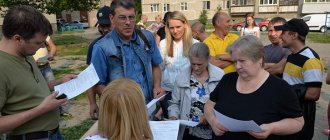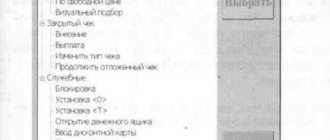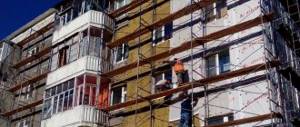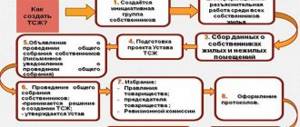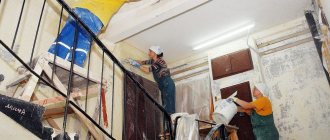Definition of the concept
The MKD Council represents the legitimate interests of apartment owners during disputes that arise with the management company or resource supplying organization. These representatives can only be elected at a special meeting.
Important: according to the Housing Code, the creation of this body is permitted in cases where an appropriate agreement has been concluded with the management company. Organizing a council is impossible if the house is managed by an HOA.
The current legislation differentiates the powers of this body and the OSS. The latter is considered the only entity capable of making decisions affecting the interests of each owner of residential premises in the house:
- procedure and terms of payment for housing and communal services or repairs (including major ones);
- choice of management company;
- procedure for using the local area and others.
Attention: members of the advisory body are elected for a period of 2 years. If this procedure is not carried out within three months after the building is put into operation, local authorities independently convene the OSS in order to select members of the future board.
At the same time, the functions of the MKD council, as well as the chairman, are determined by the OSS. When choosing the composition of this body, the votes of apartment owners are taken into account, the number of which is calculated in proportion to the living space owned.
Re-election of the body's members is also carried out within the framework of the OSS. Council members are selected from among the people living in the apartment building.
Peculiarities of electing the composition of the MKD council
The composition of the future council should be determined during the next (including planned) OSS. The current legislation does not provide for other options. The election procedure is carried out according to the same algorithm by which the next OSS is assembled. Accordingly, the step-by-step instructions are the same in both cases.
Election procedure
The election process begins with the initiation of this procedure. Every owner of an apartment in the building has the right to make such a proposal. The initiator is obliged to determine the list of persons who will subsequently join the council. A chairman is subsequently selected from this group of people. Also, the specified person develops a list of issues that the OSS participants will consider.
The initiator (or an initiative group, if one has been previously formed) is obliged ten days (no later) before the appointed date of the general meeting to notify each apartment owner about the imminent holding of the general meeting. Residents must be given the appropriate notice by sending the document by registered mail.
Attention: a number of federal laws determine that residents of a building have the right to choose a different method of notification at a general meeting. In particular, the Federal Law does not prohibit informing citizens by posting relevant notices on boards.
At the general meeting, complaints about the number of council members are considered, and the competence of the latter is determined. Moreover, as the norms of housing legislation indicate, this body does not have the right to make final decisions regarding the management of the house. That is, board members can make recommendations on such issues. However, decisions made by this body have no legal force. Residents, like third-party organizations such as management companies, have the right not to follow these recommendations.
Voting rules
The composition, number and responsibility of future members of the MKD council are determined at the general meeting. This procedure is carried out in full-time, part-time or part-time.
The latter determines the voting rules. If an in-person OCC is selected, then a quorum will be required to select the composition of the council. The latter is calculated based on the number of residents and the area of the apartments they own. Members of the advisory body are elected by a large number of votes.
Attention: only the owners of the premises have the right to participate in the general meeting. Outside parties may visit the OSS as observers.
The absentee form is convenient because a quorum is not required for voting and electing an advisory body. This option involves conducting a survey of residents of the house on issues included on the agenda of the OSS. This is how the MKD council is elected.
The last form of meeting is considered the most convenient. This option combines the advantages of the previous ones. First, a meeting is held at which the owners vote on the future composition of the advisory body. Then, within ten days, the initiators of the OSS hand over the questionnaires to the absent apartment owners. This document reflects the same issues that were discussed at the last meeting.
Regardless of the chosen form of the OSS, after the discussion, the voting results are recorded in the minutes, which are signed by the chairman and secretary (if the latter is selected). This document is submitted within 5 days to the management company. After the election of the MKD council, the Charter and regulations on this advisory body are drawn up.
Attention: the chairman of the OSS is obliged to notify all owners of the voting results within 10 days. The minutes of the meeting must be available to residents of the building.
Within the framework of the OSS, it is also possible to elect the chairman of the MKD council. To do this, it is necessary to obtain at least 75% of the votes from the total composition of the meeting. The re-election of this composition is carried out according to a similar scenario.
Create an MKD council
Home > Step-by-step instructions > Create an MKD council correctly
How to properly create an apartment building council
The state obliged owners to create councils of apartment buildings. They perform certain functions and have certain powers.
In fact, the council is called upon to defend the interests of homeowners before the management company and take upon itself all current issues of managing the house.
Step-by-step instructions for independent
The decision to create an apartment building council is made by the owners of premises in the apartment building at a general meeting. For a successful general meeting, it is necessary that an initiative group from among the owners themselves appear in the house. The initiators of a general meeting of owners can be the owner or several owners of premises in a given house (Article 45 of the Housing Code of the Russian Federation).
“If a homeowners’ association has not been created in an apartment building or the building is not managed by a housing cooperative or other specialized consumer cooperative and there are more than four apartments in this building, the owners of the premises in this building at their general meeting are required to elect the council of the apartment building from among the owners of premises in this building. Housing Code of the Russian Federation, Article 161.1, clause 1"
Step 1. Creation of an initiative group of owners. We gather an initiative group, ideally one person from each entrance, but you can act alone, remember that the main thing in this matter is initiative. Once you have assembled a team of like-minded people, immediately hold a meeting of the initiative group to discuss the problems and issues that concern you and the other residents of the house. Issue number one on the agenda is the election of the Council of the apartment building and the Chairman of the Council of the building. We draw up a list of candidates, study the Regulations on the Council and the Chairman of the Council, and if necessary, make adjustments to the documents under consideration. The final document should be the minutes of the meeting of the initiative group, which expresses the intentions of the initiators to attend the general meeting and a list of issues that they are going to discuss with the rest of the residents. So, the agenda for the planned meeting is understood, discussed with colleagues and formulated. Now you need to familiarize the rest of the residents of the house with your initiative.
Step 2. Compiling a register of premises owners The register includes owners indicating the area of premises they occupy. Members of the initiative group can contact the management company for this information. In case of refusal - to local authorities.
OPTION-1: General meeting of owners in person (through the joint presence of owners in a certain place and at a certain time)
Step 3. Notification of the upcoming General Meeting of Owners. We prepare and place in public places announcements about the upcoming general meeting at least 10 (ten) days before the date of its holding. In the announcement we indicate information about the person (persons) on whose initiative the general meeting is being held, where, when and what time the meeting will take place, the agenda, the procedure for familiarizing with the information and materials that will be presented at this meeting.
NB! It is very important to remember that only those issues that will be indicated in the announcement can be discussed at the meeting. If you forgot something, and then suddenly remembered it right at the meeting, then the decisions made on such issues will be invalid.
Step 4. Holding a general meeting. On the day of the meeting, the initiative group meets the remaining owners at the appointed place and at the agreed time. A register of owners or authorized persons who came to the meeting by proxy is compiled. We select the chairman of the meeting and the secretary to keep minutes of the general meeting. Do not forget that only owners or authorized persons by proxy vote, so everyone who comes must confirm their right to make decisions by presenting a document certifying ownership of the premises. Candidates for members of the Council and Chairman of the Council are being discussed. Voting is taking place. A vote must be taken on each individual item listed on the agenda. We express our will simply: “for”, “against”, “abstained”. It is very important to remember that the meeting is considered legitimate (authoritative) if it was attended by owners with more than 50% of the votes of the total number of votes. We remind you that the meter in the voting is - m2. A decision on the creation of an apartment building Council is considered adopted if a majority of the total number of votes taking part in the general meeting votes for it.
Step 5. Registration of the results of the general meeting of owners. The secretary of the general meeting counts the votes and draws up the final minutes. The chairman and secretary of the meeting draw up messages about the results of the general meeting and place them in the places specified in the decision of the general meeting, the most accessible to all owners.
Step 6. Document storage. Minutes of general meetings of owners of premises in an apartment building and decisions of such owners on issues put to vote are stored in the place or address determined by the decision of this meeting.
Documentation to be kept during in-person voting: - minutes of the initiative group meeting; — announcements with the agenda of the general meeting; — register of all owners; — register of owners who took part in the vote; — minutes of the general meeting; — notifications informing owners about the results of the last vote. If there is no quorum, the general meeting can be held in absentia.
OPTION - 2: General meeting of owners in absentia. Owners can express their decision on issues put to vote in absentia by delivering a ballot to the address specified in the notice. The first steps to hold a meeting in absentia are not fundamentally different from those that need to be taken when organizing in-person voting. The initiator of the general meeting/initiative group/ makes a decision to hold the general meeting in absentia. As in the first case, the agenda of the general meeting is discussed, candidacies for members of the Council and the Chairman of the Council are considered, etc. But further differences arise: Members of the initiative group must prepare notices notifying each owner of the upcoming vote.
Step 7. Preparation of notices of holding a general meeting of premises owners in absentia. The notice of holding a general meeting in absentia indicates the initiative group, a list of issues on which the remaining owners are asked to express their decisions, the address and procedure for reviewing the necessary materials and information, and the date of submission of the voting ballot.
Step 8. Making voting ballots. In such voting ballots, it is necessary to provide columns in which persons participating in the vote can indicate: full name, address of the owner, information about the document confirming ownership of the premises in an apartment building, decision on each issue on the agenda, expressed in terms of “for”; "against"; "abstained."
Step 9. Delivery of notifications and voting ballots to the owners of the premises of an apartment building. Notices and ballots for voting to the owners of the premises of an apartment building must be delivered to each apartment and handed over to the owner against signature, no less than 10 days before the decision is made. Documents must be handed over against signature.
Step 10. Registration of the results of absentee voting of owners. The initiative group processes the received ballots and, after the specified period, calculates the voting results. The final decision of the general meeting of owners is drawn up in the form of a protocol with all voting ballots attached to it. The minutes must list all issues put to a vote and the decision taken by the general meeting on each issue. The voting results are communicated to all owners by posting information sheets in publicly accessible places no later than 10 days from the end of voting.
Step 11. Document storage. Minutes of general meetings of owners of premises in an apartment building and decisions of such owners on issues put to vote are stored in the place or address determined by the decision of this meeting.
Documentation to be stored in case of absentee voting: - minutes of the meeting of the initiative group; — register of all owners; — notifications and voting ballots; — minutes of the decision of the general meeting + received notifications and ballots — notifications informing owners about the results of the last vote.
If the decision is made, then all owners, regardless of whether they took part in the voting or not, are obliged to comply with the decision of the general meeting. If someone believes that their rights have been violated, they can go to court and try to appeal the decision of the general meeting.
What percentage of votes is needed to make a decision? The competence of the general meeting of owners of premises in an apartment building includes:
- making decisions on the reconstruction of an apartment building (including its expansion or superstructure), construction of outbuildings and other buildings, structures, structures, major repairs of common property in an apartment building;
- making decisions on the limits of use of the land plot on which the apartment building is located, including the introduction of restrictions on its use;
- making decisions on the use of the common property of the owners of premises in an apartment building by other persons, including the conclusion of contracts for the installation and operation of advertising structures, if for their installation and operation it is intended to use the common property of the owners of premises in an apartment building.
- making decisions on identifying persons who, on behalf of the owners of premises in an apartment building, are authorized to conclude agreements on the use of the common property of the owners of premises in an apartment building (including agreements for the installation and operation of advertising structures) on the terms determined by the decision of the general meeting;
NB! Decisions on these issues have legal force if they are voted for by at least two-thirds of the total number of votes of the owners of premises in an apartment building. On other issues, decisions are made by at least 50% of the votes of those who took part in the voting.
Obligations of the MKD council to residents
The composition elected to the OSS does not have the right to resolve any issues that reflect the life of an apartment building. However, this advisory body has a number of responsibilities:
- monitor the implementation of decisions made at the OSS;
- negotiate with representatives of the management company on the latter’s fulfillment of certain obligations (but not sign documents);
- monitor the implementation of repair work;
- monitor the quality of housing and communal services provided.
The council is also obliged to bring up for discussion issues on the following issues:
- operating conditions of the building and surrounding area;
- conditions and procedure for repairing the building;
- ways to manage a home;
- level of competence of members of the advisory body;
- terms of cooperation with the management company.
Attention: the advisory body, despite the lack of legally significant powers, is required to submit a report annually. This document is issued for general consideration within the framework of the next OSS.
This body combines the responsibilities of initiative groups, which are often found in apartment buildings. In particular, council members can:
- contact the management company with proposals for landscaping the territory or building;
- evaluate contracts with resource supply organizations;
- perform other actions.
Decisions on each issue are submitted for general discussion.
Instructions: how to elect a new council of an apartment building ahead of schedule
The agenda of general meetings of owners often includes the issue of re-election of the council of an apartment building. This issue falls within the competence of the general meeting by the Housing Code of the Russian Federation, but decisions on it are not always recognized by the court as lawful.
According to parts 9, 10. Art. 161.1 of the Housing Code of the Russian Federation, the council of an apartment building is valid until re-election at a general meeting or in the case of a decision to create a HOA before the election of its board. In this case, the council is subject to re-election every two years, unless the owners have established a different term for the council. If, after the end of the term of office, the owners have not decided to re-elect the council, then its powers are automatically extended for the same period. If the council of an apartment building does not perform its duties properly, it may be re-elected early by the general meeting. The Housing Code of the Russian Federation does not contain any other grounds for early re-election.
Situations arise when a council is elected and functioning in a house, but a new initiative group appears that also wants to be on the house council and does not want to wait for the end of the term of office of the current council, or it is dissatisfied with the work of the council members and wants to replace them quickly. Members of the old council of an apartment building usually go to court to challenge such decisions, and if the meeting is held with violations or the agenda items are formulated incorrectly, then the courts often satisfy the claims of the owners and recognize the decisions on the early re-election of the council of the apartment building as invalid.
Recognizing the decision of the general meeting on the early re-election of the house council as invalid, the courts indicated that indicating in the agenda of the general meeting the reasons for the re-election of the house council is mandatory. The absence of such information in the notice of the general meeting, in the opinion of the court, is a significant violation of Art. 161.1 of the Housing Code of the Russian Federation.
The voting agenda includes the issue of terminating the powers of the current council and its chairman, as well as the election of a new house council with a different number of members and for a different period, and the election of a new chairman. The court considered such decisions illegal: “the law prohibits the unjustified early termination of the activities of the elected council of the premises of an apartment building, the powers of which are terminated only upon the expiration of the validity period established by the general meeting of owners. At the same time, it is impossible to change the validity period of the powers before the expiration of the specified period. Early termination of the council's activities is possible only in the two above-mentioned cases, which are directly specified in the law: making a decision to create an HOA, improper performance by council members of their duties.
For the re-election of the house council, the following recommendations apply:
– when re-electing the council of the house, make sure that the powers of the previous council of the house expire, and hold a meeting to elect the council of the apartment building in connection with the expiration of the term of office of the previous council;
– if there is a need for early re-election of the council, collect information about the improper work of the current council, this may be useful in defending the decision of the meeting in court.
- before noting what the improper work of the house council is, be sure to open and read Art. 161.1 of the Housing Code of the Russian Federation, look at the powers of the council so that it does not turn out that you are expecting the council to exercise powers that it is not endowed with.
– the agenda of the meeting must include the reason for re-election; you can include separate questions about recognizing the work of the current council as improper and about terminating its powers in this regard.
- if the number of the elected council of the house differs from the number of the previous one, then it is better not just to limit itself to indicating a list of names, but also to reflect in the decisions the establishment of a new number of the council of the apartment building.
– do not forget that only the owners of the premises of this house can be elected to the house council.
Dear readers! We invite you to join the discussion of the news in our groups on social networks - VK and Facebook
What do representatives of the MKD council have the right to do?
The main task of this body is to protect the rights and legitimate interests of owners. The council of apartment buildings can act on behalf of apartment owners in disputes with the management company or resource supply organization regarding the provision of poor-quality services or failure to fulfill their obligations. In particular, members of this body have the right to properly record such violations and provide relevant evidence to the Criminal Code with a requirement to eliminate the identified problems.
The council participates in signing reports on completed repairs (including major repairs) or recording damage to the owners’ property (flooding, intentional damage). Both documents are drawn up by representatives of the management company. If the latter refuse to fill out such acts, members of the advisory body have the right to carry out this procedure. In addition, the council may initiate an extraordinary meeting of owners.
Appointment of the Chairman of the MKD
The Chairman is appointed during the OCC. The qualification requirements of the person accepting this position do not play a determining role. It is recommended to appoint a person as chairman who has the following qualities:
- has authority among the residents of the house;
- is distinguished by an active civic position;
- having the ability to defend the interests of the public.
Important: due to the specifics of the chairman’s work, the person appointed to this position must have sufficient knowledge in the field of construction and jurisprudence.
The future head of the apartment building is selected from among the council members of the apartment building.
Legal status of MSKD
The Council is not a legal entity. person, so he does not pay taxes and does not report to regulatory authorities. SMKD does not have its own property, its members and the director do not receive wages.
The Council does not have the right to carry out commercial activities at the expense of common property or demand any payments from the owners of residential property. One of the council members cannot entrust the performance of his functions to another person.
According to clause 8.1 of Art. 161.1 of the Housing Code of the Russian Federation, owners of residential space may decide to pay monetary remuneration to council members or the chairman. If such a decision is made, the size, conditions and procedure for payment should be reflected in the protocol.
Thus, the council is a voluntary body that is created from among active and proactive residents to control the activities of the management company and represent the interests of the owners.
List of duties of the chairman
The chairman acts on behalf of both the advisory body and other people living in the house. This face:
- conducts negotiations with representatives of the management company on the composition and terms of the agreement, which will be signed by the owners with the management organization;
- develops a draft agreement with the management company, after which it submits the document for discussion;
- carries out monitoring activities, monitoring the fulfillment of obligations by representatives of the management company;
- signs acts on the work performed by representatives of the management company.
Attention: residents of apartment complexes can give the chairman the right to act as a representative of the owners in court when considering cases on problems arising due to the provision of low-quality services by the housing complex or management company. This person acts on behalf of the tenants on the basis of a power of attorney.
The chairman's responsibilities include monthly inspection of the condition of the roof and other structural or important elements of the building. In addition, the owners may authorize the person appointed to this position to enter into appropriate agreements with the management company.
To confirm his own powers, the chairman is required to take an extract from the minutes of the last OSJ. This document must reflect the date of the general meeting at which the person was elected, the address of residence and the term of office of the latter. The statement also reflects the decision to appoint the chairman. The document is signed by the secretary (if selected) and the chairman. Then the extract is endorsed by representatives of the local government who were present at the election process.
Chairman's rights
The Chairman of the MKD is vested with the following rights:
- sign contracts on behalf of the owners of apartments in the building;
- make amendments to previously drawn up contracts;
- determine the need and agree on the timing of building repairs;
- inform residents about changes in the terms of cooperation with management companies and housing and communal services;
- maintain control over the activities of the management company and third-party organizations that are engaged in repairs of the building;
- sign acts of flooding, property damage and others.
The chairman is a trusted person who speaks on behalf of the residents. This person does not have the right to carry out actions that infringe on the legitimate interests of apartment owners.
Council of apartment building owners
The participation of residents in the maintenance of apartment buildings is their responsibility. The law allows the use of any method, including refusal to cooperate with the management company and the creation of a HOA or cooperative. You can cooperate with management companies, while creating your own legal organization.
If residents hire a management company, they are required to form either an association or a board of owners.
That is, the body that will represent the interests of the owners. If the council is not created by the residents, this procedure will be initiated by the management company. If there is a cooperative or partnership in an apartment building, there is no need to create an additional management body.
Rights and obligations
The council of an apartment building in the Russian Federation Residential Complex has a number of rights and responsibilities. These include the following:
- The duty to ensure the implementation of decisions made at the general meeting of residents.
- Making proposals regarding the use of common property, carrying out repairs of apartment buildings, as well as concluding contracts with contractors.
- Monitoring the actions of authorized persons aimed at maintaining common property, carrying out repairs, providing utilities, etc.
- Providing apartment owners with reports on the work done.
These are the main powers that the board of owners has. If necessary, this list can be expanded. But the rights and obligations of the council should not violate the legislation of the Russian Federation.
Read about the rules for parking in the courtyard of an apartment building. Do residents of an apartment building have rights to the local area? See here.
Charter
By law, the council may not create a Charter or any other similar document, since it is not a legal entity. But it is better if such a document is nevertheless drawn up. Then the activities of the public body will be much more effective.
The charter must contain the following points:
- Conditions for holding elections.
- Powers and responsibilities of the council and its chairman.
- The procedure for paying remuneration to the management of the council.
- Procedure for re-electing the chairman.
It is advisable not to include a large number of points in the document. It is enough to provide only basic information to avoid confusion.
